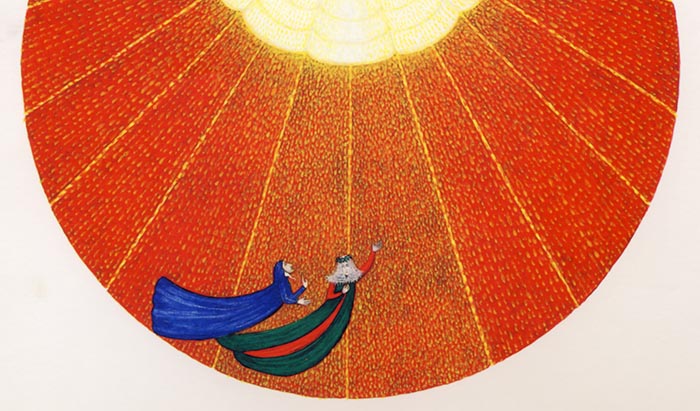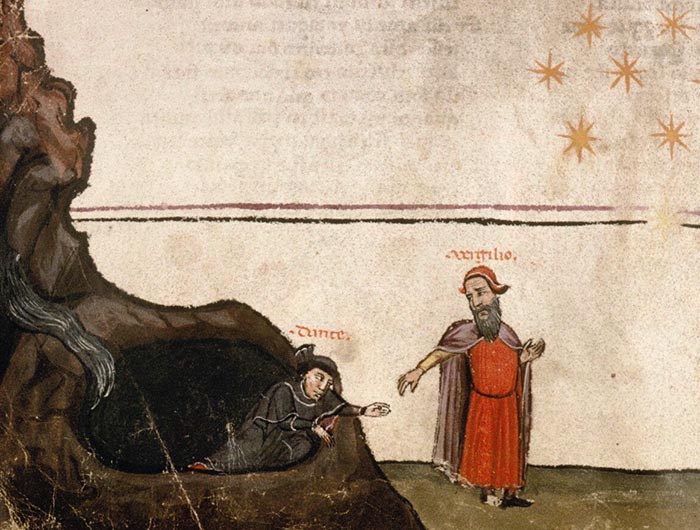News & Views
Dante’s Divine Comedy: a Guide for the Spiritual Journey by Mark Vernon
Barbara Vellacott reviews a new book which guides us through Dante’s epic poem canto by canto

Illustration to Paradiso, Canto 32: Dante and Beatrice rising towards the Celestial Rose. Painting by Monika Beisner
The prospect of reading the whole of Dante’s Divine Comedy on one’s own is probably daunting. The English editions tend to come in three volumes, Inferno, Purgatorio and Paradiso, each with the Italian and English translation side by side. In addition, many of them include multiple and extensive notes to each of the 100 ‘cantos’ to explain points of language, context or interpretation. All this makes for three rather fat books, and not everyone has the stamina to embark on reading without a guide.
In the Divine Comedy Dante has two wise guides – the classical Roman poet Virgil who accompanies him to the end of Purgatory, and Beatrice who takes over in Paradise. For us, Mark Vernon [/] in Dante’s Divine Comedy: a Guide for the Spiritual Journey [1] is an admirable and illuminating guide who is able to unravel the meanings of this complex medieval work for a contemporary audience. He is well placed to do this, being a practising psychotherapist as well as a theologian and a physicist who is known for his podcast conversations with scientists such as Rupert Sheldrake. His previous books include A Secret History of Christianity [2] (see our review), which is based on the ideas of Owen Barfield, and an introduction to classical Greek thought (The Idler Guide To Ancient Philosophy).[3]
What is this book? It is a progress, canto by canto, through the conditions of Hell, Purgatory and Paradise. A short chapter on each canto describes what happens as narrative, and reflects on its symbolism and inner meaning with psychological insights on universal human experience.
Of course, a book about the Divine Comedy is not a substitute for reading the actual poem, as the author would surely agree; he himself acknowledges that reading it in a guided group was important for his own experience. So, I asked myself: ‘How might one approach this book in order to bring one into the closest relationship with the original?’ – and I suggest the following possibilities.
First, you could do worse than to read the book as an introduction to the Divine Comedy and to leave it there; you will find many psychological and spiritual insights, and will get a good idea of the whole as a journey through life’s experiences. If, however, you truly want to read the Divine Comedy, this obviously will not do. You could, therefore, read it and then the poem, or read the poem and then the book – preferably one volume at a time.
A more reflective approach, with a greater possibility of in-depth appreciation, could be to read the poem slowly, stopping after each canto to think and read Vernon’s chapter on it. It is also worth reading some of the tercets aloud in a good translation, in order to sense their lyric quality, which itself conveys meaning. For myself, I knew the poem fairly well already and tried this approach in several places. At every point I found that Vernon offered new insights and greatly deepened my appreciation.
His commentary on Canto 27 of Purgatorio is a good example of how he offers us imaginative insights. His exploration of Dante’s feelings on entering the purifying fires through which he must go in order to see Paradise intensifies our realisation that the thread of love – human and divine – runs throughout the Divine Comedy. If we have followed the story, we see more clearly Dante’s inner struggle. ‘The flames’, the author says, ‘strengthen love’ so that, purified of pride, envy and greed, it can refocus and ‘carry the soul to the goal of all desiring’.
There are several great virtues of this book. First, it is a relief not to have to go into all the contextual notes, since the author tells you just enough to make sense of the narrative element. Notes, and the feeling that you ought to read all of them can be a heavy drag on spontaneous enjoyment and gathering insight.
Another virtue is that Vernon in his commentary integrates the psychological and spiritual elements of the journey, and the theme of the growth through human to divine love mentioned above is a central example of this.
A third very helpful dimension for our age is the fact that he acknowledges that at many points Dante is limited by the ideas and prejudices of his time. For instance, he puts the Prophet Mohammed with other schismatics (including Christians) in hell, though we know today that he was much influenced by Islamic philosophy. The general run of suicides are also stuck in hell, but Cato, the pre-Christian Roman, who famously took his own life, is found in Purgatory. But Vernon perceives that Dante, like any travelling soul, is moving towards a more comprehensive and inclusive vision of cosmic reality.
The sense of inclusive vision grows, until, in Canto 33 of Paradiso, when Dante has his first glimpse of ‘eternal Light’, we read:
In its depth I saw contained,
by love into a single volume bound,
the pages scattered through the universe.[4]
Everything – Hell, Purgatory, Paradise – is included in one vision.
It is a pity that the book contains no map of the universe as Dante envisaged it, and no maps of Hell, Purgatory and Paradise. Presumably this is because the author assumes that his readers will have a copy of the actual poem, most editions of which include such maps.
Some may find a problem in being frequently told that Dante intended his poem to be a great transformative lesson. Experiences for readers cannot be prescribed. However, it is important to realise that the journey – and the writing of the poem – was a transformation for Dante; he is not the same person as he was in the dark wood with no way forward at the start of Inferno. Also, Mark Vernon’s book has a living quality which must surely come from the fact that the author himself is making the journey through Hell and Purgatory, with ultimate glimpses of Paradise. We as readers can travel with him – and with Dante.

15th-century illustration of Inferno, Canto 34: Virgil leads Dante out of hell ‘to see the stars again’. Image: Bodleian Library MS. Holkham misc. 48, f. 94
For Mark’s article for Beshara Magazine, Dante, Erotic Love and the Path to God, which is a commentary on Canto 9 of Purgatorio, click here [/].
You can learn more about Mark’s many projects on his website: click here [/].
Barbara Vellacott:
With a background in adult education and overseas development issues, Barbara Vellacott now teaches poetry. She is the poetry editor of Beshara Magazine. For her ‘Thing of Beauty…’ on Dante’s Divine Comedy, click here
More News & Views
Poems for These Times: 18 – New Year 2024
Benjamin Zepahniah | Faceless
“You have to look beyond the face
to see the person true
Down within my inner space
I am the same as you…”
Introducing… ‘Tiger Work’ by Ben Okri
Barbara Vellacott reads from and discusses a new book of stories, parables and poems about climate change
Book Review: “Elixir: In the Valley at the End of Time” by Kapka Kassabova
Charlotte Maberly reviews a book about the search for wholeness, and a heartfelt plea to reclaim our spiritual, physical and emotional unity with nature
Book Review: “Work: A Deep History” by James Suzman
Richard Gault reviews a new book which takes a radical approach to contemporary work culture
Introducing… Bernardo Kastrup and Swami Sarvapriyananda
Charlotte Maberly appreciates a wide-ranging video conversation about Eastern and Western concepts of the self and mind
Connecting Threads on the River Tweed
Charlotte Maberly investigates an innovative project which explores cultural engagement as the driver of ecological change
FOLLOW AND LIKE US
——————————————
——————————————
——————————————
Sources (click to open)
[1] MARK VERNON, Dante’s Divine Comedy: a Guide for the Spiritual Journey, (Anglico Press, 2021).
[2] MARK VERNON, A Secret History of Christianity (John Hunt Publising, 2019).
[3] MARK VERNON, The Idler Guide To Ancient Philosophy (Idler Book, 2016).
[4] DANTE, The Divine Comedy, translated by Robert & Jean Hollander (Anchor Books, reprinted 2018).
If you enjoyed reading this article
Please leave a comment below.
Please also consider making a donation to support the work of Beshara Magazine. The magazine relies entirely on voluntary support. Donations received through this website go towards editorial expenses, eg. image rights, travel expenses, and website maintenance and development costs.
READERS’ COMMENTS
7 Comments
Submit a Comment
FOLLOW AND LIKE US
In the Divine Comedy Dante has two wise guides – the classical Roman poet Virgil who accompanies him to the end of Purgatory,
Hell and Purgatory, with ultimate glimpses of Paradise. We as readers can travel with him – and with Dante.
All this makes for three rather fat books, and not everyone has the stamina to embark on reading without a guide.
I have been reading posts regarding this topic and this post is one of the most interesting and informative one I have read. Thank you for this!
I’ve found so much peace and clarity from the spiritual practices shared here.
The insights you glean from spiritual literature are like seeds of wisdom, planting themselves deep within the heart and blossoming into transformative understanding.
It feels as though the author has tapped into a universal truth.